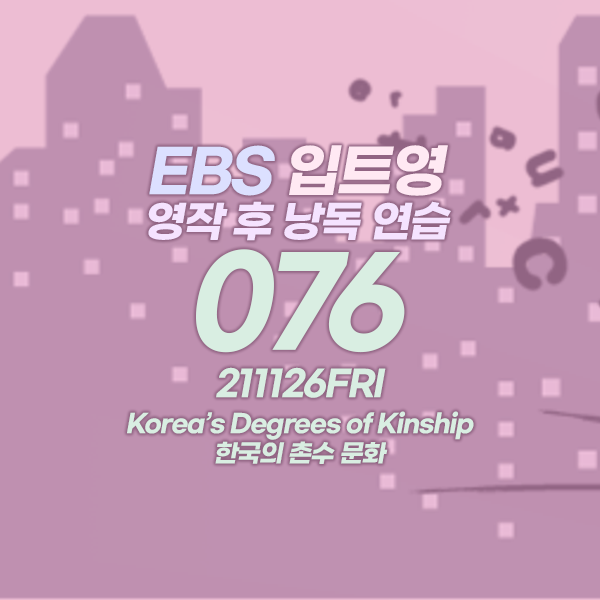
입트영 영작 076 - 211126FRI Korea’s Degrees of Kinship 한국의 촌수 문화
영작 후 낭독 연습
JESS 076 - 211126FRI
(211126FRI / Korea’s Degrees of Kinship / 한국의 촌수 문화)
STUDY GROUP QUESTIONS
1. Describe how kinship terms are different in other countries.
2. How do you remember what to call your distant relatives?
3. Do you think the terms by which we call our relatives influence our relationships?
1. 다른 나라에서 친족 용어가 어떻게 다른지 설명하세요.
2. 먼 친척들을 어떻게 불러야 할지 어떻게 기억하나요?
3. 당신은 우리가 친척이라고 부르는 용어가 우리의 관계에 영향을 준다고 생각하나요?
1. Describe how kinship terms are different in other countries.
English-speaking countries have no concept of 'chon' like Korea.
There are titles for relatives, but they are a little more simplified than in Korea.
Spouses corresponding to no chon are called with spouse, partner, husband, hubby, wife, wifey, etc.
The titles between parents and children corresponding to one chon are as follows.
Father, dad (아버지, 아빠), mother, mom (어머니, 엄마), daughter, my girl (딸), son, my boy (아들).
The titles of siblings and grandparents corresponding to two chon are as follows.
(older/elder) Sister (언니, 누나), younger sister (여동생), (older/elder) brother (오빠, 형), (younger) brother (남동생).
Grandfather, grandpa (할아버지), Grandmother, grandma (할머니), but Korean calls maternal parents with '외' (외할아버지, 외할머니) which is attached to the front, but in the English language, there is no distinction between paternal and maternal families.
The titles of the siblings of the parents corresponding to three chon are as follows.
Uncle (삼촌, 외삼촌, 고모부, 이모부), aunt (이모, 고모, 숙모, 외숙모).
Unlike Korea, it becomes quite simpler and also there is no distinction between paternal and maternal families. One thing to remember is that people usually call uncle or aunt with the name, like uncle Sam.
The cousins and nephews who are considered four chon are as follows.
Cousin (사촌), nephew for boy and niece for girl (조카). It's different since Koreans call them just one name.
2. How do you remember what to call your distant relatives?
I can't remember because I haven't seen my distant relatives for a thousand years, but when I was a little, I just copied my older sister all the time, so It has never been a big deal for me. Nowadays, people can just look up the information on their phone easily and also don't really have a chance to meet each other that often, so they would never be in trouble with how to call their distant relatives.
3. Do you think the terms by which we call our relatives influence our relationships?
Yes. Those terms influence your relatives’ relationships. This culture, centered around relationships, influences all aspects of Korea. In this way, it’s similar to jeong, a sense of attachment.
1. 다른 나라에서 친족 용어가 어떻게 다른지 설명하세요.
영어권 국가에서는 한국처럼 '촌'이라는 개념이 없다.
친척들에 대한 호칭은 있지만 한국보다 더 간소화된다.
무촌에 해당하는 배우자를 spouse, partner, husband, hubby, wife, wifey 등으로 부른다.
1촌에 해당하는 부모와 자식을 부를 때의 호칭은 다음과 같다.
Father, dad (아버지, 아빠), mother, mom (어머니, 엄마), daughter, my girl (딸), son, my boy (아들).
2촌에 해당하는 형제자매와 조부모의 호칭은 다음과 같다.
(older/elder) Sister (언니, 누나), younger sister (여동생), (older/elder) brother (오빠, 형), (younger) brother (남동생).
Grandfather, grandpa (할아버지), Grandmother, grandma (할머니), 하지만 한국인은 그 호칭 앞에 붙이는 '외' 로 외가쪽 조부모를 부르지만 영어에서는 친가와 외가의 구분이 없다.
3촌에 해당하는 부모의 형제자매의 호칭은 다음과 같다.
uncle (삼촌, 외삼촌, 고모부, 이모부), aunt (이모, 고모, 숙모, 외숙모).
한국과 달리, 호칭이 꽤 간단해지고 친가, 외가의 구분도 없다. 한 가지 기억해야 할 것은 보통 삼촌이나 고모를 Uncle Sam과 같이 이름과 함께 부른다는 것이다.
4촌인 사촌과 조카는 다음과 같다.
Cousin (사촌), 남자아이 조카는 nephew 그리고 여자 아이 조카는 niece 이다. 한국 사람들은 한 가지 호칭으로만 부르는 점이 다르다.
2. 먼 친척들을 어떻게 불러야 할지 어떻게 기억하나요?
먼 친척들을 못 본지가 너무 오래 되어서 기억이 잘 안 나지만, 어렸을 때는 항상 언니를 따라해서 별 문제가 없었다. 요즘은 휴대폰으로 쉽게 검색할 수 있고 그렇게 자주 만날 기회도 없어서 먼 친척을 어떻게 불러야 할지 어려울 일은 없을 것 같다.
3. 당신은 우리가 친척이라고 부르는 용어가 우리의 관계에 영향을 준다고 생각하나요?
그렇다고 생각한다. 그런 호칭들은 친척들과의 관계에 영향을 준다. 관계를 중심으로 한 이러한 문화는 한국의 전반적인 면으로 영향을 미친다. 이런 점에서 정의 개념과도 비슷하다.
'3_____Writing Practice > EBS 입트영 영작 (2108-2112)' 카테고리의 다른 글
| 입트영 영작 078 - 211130TUE Taking the TOEIC Exam as a Challenge 토익 시험 도전기 (0) | 2021.12.01 |
|---|---|
| 입트영 영작 077 - 211129MON Adorable Elementary School Children 사랑스러운 초등학생들 (0) | 2021.12.01 |
| 입트영 영작 075 - 211125THU Intellectual Property 지적 재산 (0) | 2021.11.25 |
| 입트영 영작 074 - 211124WED Kindergartens for Senior Citizens 노인 유치원 (0) | 2021.11.24 |
| 입트영 영작 073 - 211123TUE Veganism 비거니즘 (0) | 2021.11.22 |



